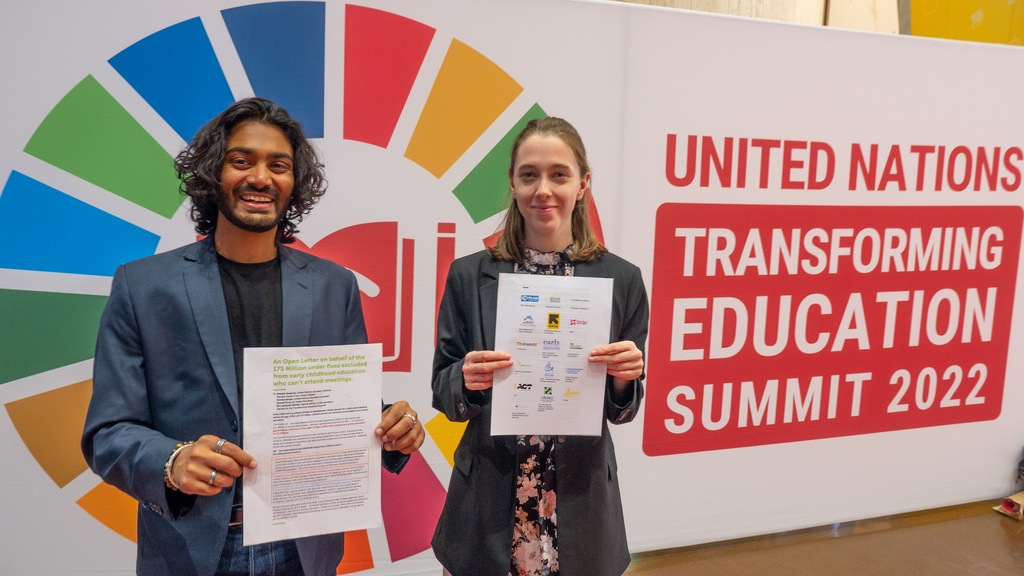
“We’ve had enough. We want to be heard, we want to be acknowledged”

Global Youth Ambassadors
Ahead of the historic Transforming Education Summit, young campaigners reveal their frank views on the need for urgent action, greater choice and more positive results.
Just four weeks to go – and the voices are getting louder. Young people are making it quite clear what they expect from world leaders at the historic Transforming Education Summit: urgent, decisive and long-lasting action.
In the run-up to those top-level talks at the United Nations General Assembly, Theirworld has been ensuring the views of youth campaigners are front and centre when it comes to solving the global education crisis. We have:
- Launched the #LetMeLearn campaign, which is growing week by week into a vibrant movement calling for quality and inclusive education for all
- Issued a powerful and passionate statement from our Global Youth Ambassadors, expressing their frustration over the 260 million out of school and millions more not learning the basic skills
- Gathered the views of thousands of young people through our Global Youth Survey
While carrying out the survey, we asked more in-depth questions of young people in various countries. Here are some of their answers (given anonymously).
What do young people want to tell world leaders at the Transforming Education Summit?
We’ve had enough. We’re not here to check boxes and say we have gotten education as per current standards. We want to be heard, we want to be acknowledged. We want a more inclusive and intersectional approach to education. We want more choices and we need better options. This isn’t enough for us or our future. We need better tools and we need better resources.
Female, India
You need to do actual work rather than cosmetic speeches and projects. It is better investing in sustainable education where it wlll actually have results. You need to approach education in a comprehensive way and not exclude it from other branches of society.
Female, Azerbaijan
Why is education an important investment in our future?
Education is important for societal growth, global development and personal development and empowerment. World leaders and everyone should do their best to ensure that every child has equal rights and access to education to help build the world we all deserve. Children are the future leaders and if they are not given the right foundation to stand firm in society, then we will not have a legacy.
Female, Nigeria
Commit more funds and resources to ensure every child gets an education. Education is the only key that will allow other Sustainable Development Goals to be achieved. Without education, achieving other goals will be impossible.
Male, Gambia
Why is it important to prioritise education when fighting for wider social justice?
Education is crucial to solving other current crises. If we are to live in a better world, we need proper investment in education everywhere and not just in the global north. No one should be left behind.
Female, United Kingdom
Any last words?
Education is a fundamental right.
Many responses including from Philippines, Lebanon, United States, South Africa, United Kingdom, India, Nigeria, Moldova, Zimbabwe, Hungary, DRC, Uganda, Turkey.
Digging deeper into our youth survey
When Theirworld launched the #LetMeLearn campaign, we also revealed some of the key findings from our Global Youth Survey of 10,000 young people in 10 countries – France, Germany, Honduras, India, Indonesia, Kenya, Nicaragua, Nigeria, United Kingdom and United States. It showed that education systems are failing a generation and leaving them unprepared for the future.
Nearly four out of five (77%) of the young people polled say they are “worried” by the prospect of poor education leaving millions of children without basic reading or writing skills by 2030. 69% say world leaders are not doing enough to ensure all children receive a quality education and 88% believe leaders need to take urgent action to fund education.
But a deeper dive into the statistics reveals some interesting differences among the views from various countries. While 69% of the total survey don’t believe world leaders are doing enough, that figure soars to 86% in Honduras and 80% in Nicaragua. But in India, only 55% feel leaders are failing.
Asked how they felt about their own education experience, 31% of those in Nigeria go for the option “disappointed”. That compares with 22% in the UK, only 12% in India and an overall total across the 10 countries of 19%.
Those who choose the option that their education “could have been better” are posed a series of further questions. Asked if they don’t feel that their education has equipped them for the future, 43% of the total agree. That figure is highest in Germany at 56% and Indonesia at 52% – and lowest in Kenya, where the 16% is well below any other country.
Asked if they are optimistic about their future, 76% of all those surveyed say yes. That rises to 93% in Kenya and is lowest in the UK at 63%.
More news

